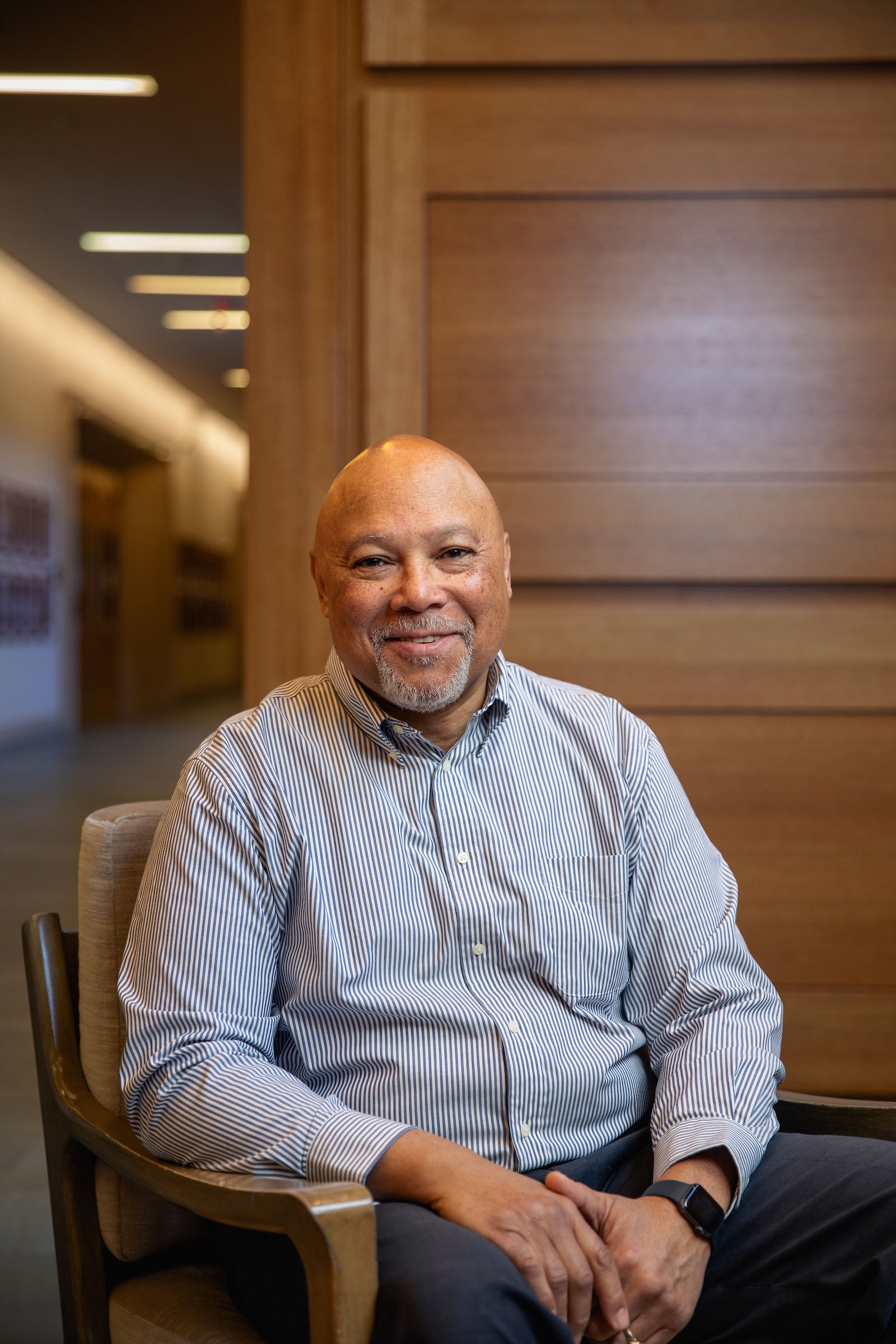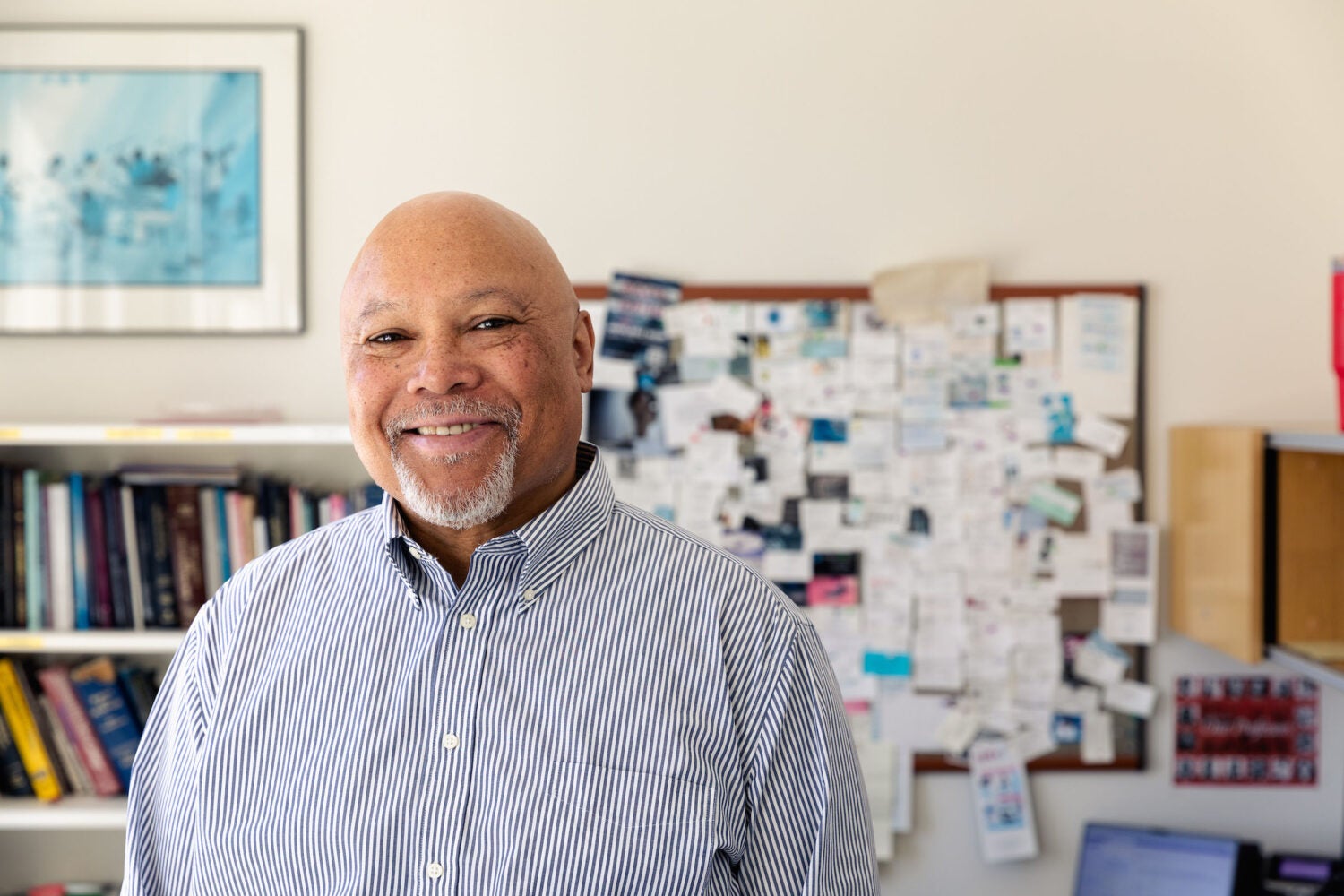“When people try to navigate the legal world without representation, deterred by the cost, they are at a structural disadvantage compared to those who know the rules of the game,” Clinical Professor Brian Price said in a 2017 Harvard Law School panel event on improving access to justice.
During his decades-long career at Harvard Law School, Price, the founding director of Harvard Law School’s Transactional Law Clinics, has worked to ensure that hundreds of low-income entrepreneurs, creatives, and business owners had access to the legal advice they’ve needed to establish initiatives and local businesses that sustain communities and the people who live in them.
As founder of several student practice organizations at Harvard Law School that provide legal advice to start-up enterprises and aspiring artists and musicians, Price has also built and cultivated an extensive alumni network in the entertainment and music industries.
Price is retiring this summer after 27 years of dedicated service to the Harvard Law School community.
“Brian has been a vital member of the Harvard Law School clinical community for more than two decades,” said Chris Bavitz, vice dean for Experiential and Clinical Education at Harvard Law School. “His work with the Transactional Law Clinic has been pathbreaking, and his stewardship of the Recording Artists Project has helped clients and exposed students to the important work of supporting creators as they navigate legal and business issues.”
“As I reflect on my career with Harvard Law School, I am filled with gratitude,” said Price. “There’s no greater career fulfillment that I could ever imagine than to have been able to teach students while working with them side by side in assisting clients in need. HLS gave me the intellectual space and trust to design and implement a curriculum to teach students effective and ethical legal practice and client care in the context of real-life situations. I am deeply indebted to HLS and the many students, colleagues, and clients I’ve come to know throughout the years.”
Price began his career at Harvard Law School in 1997 as a senior clinical instructor at the WilmerHale Legal Services Center Community Enterprise Project, which helps facilitate economic development and provides legal services to community-based entrepreneurs and organizations who might not otherwise have access to low-cost legal services.
Liz Solar, who served as director of externships for 18 years at the Office of Clinical and Pro Bono Programs, described Price as a “kind, thoughtful teacher and attorney.” She worked closely with Price as part of the Community Enterprise Project at the Legal Services Center and said his meticulous attention to detail was particularly noteworthy. “What I remember most about his client work and his supervision of students is his keen and razor sharp focus when reviewing and drafting contracts,” she said. “He read and thought about every line in a contract to the benefit of his clients, teaching students and young attorneys this critical skill.”
In 1998, he founded the Harvard Law School Recording Artists Project, known as RAP. The student practice organization provides students passionate about pursuing a career in music law with the opportunity to work with musicians and artists in the local community, helping to draft and negotiate recording contracts, and review artists’ and managers’ agreements, publishing deals, endorsements, and licensing and merchandising contracts.

In 2006, Price and his then-student Kevin Mosher ’06 represented one of the group’s most famous clients, Esperanza Spalding, a five-time Grammy award winning jazz bassist and singer, when Spalding was looking to sign on with a management company in Spain after graduating from Berklee College of Music. Spalding later served as a professor of the practice in Harvard’s Music Department from 2017 to 2022.
Price was named a clinical professor of law in 2006, and he served as director of the Wilmer Hale Legal Services Center of Harvard Law School, in Jamaica Plain, from 2006 to 2009.
He was named director of the Transactional Law Clinics, which includes the Business and Non-Profit Clinic, Real Estate Clinic, Entertainment Law Clinic, and Community Enterprise Project, in 2007.
The Transactional Law Clinics operate like a small general practice law firm within the law school, helping hundreds of low-income clients each year — from representing a startup getting formed as a legal entity to helping with contracts; financing and employment issues; and intellectual property, trademark and government filings, among other things. Since its founding, the clinics have provided hundreds of clinical students the invaluable opportunity of serving their community while getting hands-on experience in a substantial part of contemporary legal practice.
Lecturer on Law Noel Roycroft, the deputy director of the Transactional Law Clinics who co-teaches the Transactional Law Clinical Workshop with Price, said: “When I think of everything Professor Price has accomplished over his nearly three-decade tenure at Harvard Law School, I am very humbled,” she said. “He was a pioneer in developing the Transactional Law Clinics at a time when the need for these types of law school clinics that focus on economic justice and community and economic development was not yet widely recognized.”
“In working with Professor Price over the past six years, there is so much I have come to appreciate about him: the humanity he brings to work each day, the amount of empathy he has for his clients, students, and staff, and his continued commitment to learning and developing. Countless clients, students, and clinical instructors have benefited from his counseling, wisdom, and guidance,” Roycroft continued. “He more than deserves his retirement, but TLC and the community it serves will certainly feel his absence.”
He was a pioneer in developing the Transactional Law Clinics at a time when the need for these types of law school clinics that focus on economic justice and community and economic development was not yet widely recognized.
Noel Roycroft, lecturer on law and deputy director of the Transactional Law Clinics
Among its thousands of clients, the clinics helped incorporate a downtown Boston brewery, Democracy Brewing, the first brewery in Massachusetts to launch as a worker-owned owned business. Clinic students advised the fledgling company, including helping the brewery set up a direct public offering to raise the initial capital needed to start the business.
Additionally, Price oversaw the founding of and served as the faculty advisor for the Harvard Law Entrepreneurship Project, a student practice organization providing legal advice to start-up enterprises.
Before coming to Harvard, Price worked in state government as general counsel and senior director of certification and enforcement in the Office of Minority and Women Business Assistance. Among his many responsibilities, he oversaw a department that evaluated business enterprises to determine their eligibility to participate in federal and state economic initiatives. Price, who began working in the office in the early 1990s, was in charge of rewriting regulations about who would qualify for work programs, and he helped generate countless work opportunities for Black people and women for Boston’s Big Dig, a $14 billion dollar highway construction project to remediate the congested city’s Central Artery.
Earlier in his career, he worked as assistant counsel for Liberty Mutual Insurance Company, and maintained his own community-based law practice specializing in general business, corporate, entertainment, real estate, and non-profit law.
In a 2023 article, Price said the Transactional Law Clinics’ mission has always been to give people the tools they need to foster their own long-term financial success.
“Helping people with their businesses, helping people with their transactions — this is a form of advancing society that doesn’t just simply react to crises, but instead tries to get ahead of crises and help people to proactively build something,” says Price. “We are always here to support what our clients are trying to do.”
Want to stay up to date with Harvard Law Today? Sign up for our weekly newsletter.
